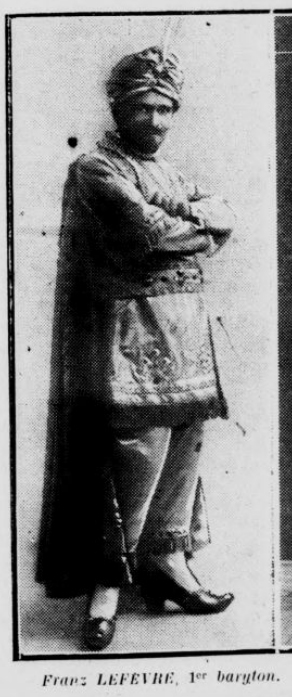Franz Lefèvre used to be a mystery singer. His only available recording, the one above of course, is from a 1930
disc – a HMV, but of utmost rarity nonetheless, people who have ever seen that disc must be few indeed. The prominent
Belgian collector Yves Becko owned it, and so it was published on the CDs devoted to Becko's collection after his death.
And wherever you look, Franz Lefèvre shows up in the context of those Becko CDs, but he's just a name, no further
information traceable.
It was a difficult research, but I did find him. The problem is that between HMV back in 1930, Yves Becko and the editors of
the Becko CDs, someone made the mistake of classifying Lefèvre as a tenor (and so he resided among the Belgian tenors
also on Historical Tenors, for many many years). In fact, though, he was a baritone; a high-timbred baritone, as the
recording proves, perhaps a baryton-martin, but definitely a baritone, throughout his career. But since he is always
considered a tenor, it's perhaps worth unraveling the mystery, even on a tenor website.
Lefèvre was from Charleroi, where he began his career in concerts; for instance, he sang in Edgar Tinel's oratorio
Franciscus on February 18th, 1917. After World War I, he was still in Charleroi, singing at the legendarily popular theater
"Les Variétés". Originally primarily for circusses and similar spectacles, Les Variétés had,
under a new owner, just begun, in 1916, to stage also operetta and opera, and Lefèvre soon joined the troupe.
A few years later, he was very busy on the young Belgian radio: operetta, opera and solo concerts for
the Brussels station. Detailed radio programs are available for the years 1925 and 1926 (later, with the increasing number
of radio stations, information in listings magazines became much scarcer for every program, and contributing artists were
typically no longer listed); in those two years, Lefèvre gave two solo concerts, and participated in complete
performances of or excerpts from: Miss Helyett, Mignon, Le petit duc, La mascotte, Lohengrin (as Heerrufer), La fille de
Madame Angot (thrice), Les pêcheurs de perles, Madama Butterfly, La belle Hélène, Les dragons de Villars,
Le chemineau, La bohème (as Marcello), the first complete Aida on the Belgian radio, Roméo et Juliette, Si
jétais roi, Il barbiere di Siviglia (I think as Figaro), Véronique, Le maître de chapelle and Les
cloches de Corneville.
But he did not sing exclusively on the radio in those years; he sang during the Easter season in Laval (France) in
1925 (in minimum three works: Si j'étais roi, Les cloches de Corneville and La fille du tambour-major). At least for
the 1928/29 season, he was a member of the Municipal Theater of Tourcoing in the very north of France, where he sang
Rigoletto in February 1929. And he was still active in 1930, when he did not only make his recording of "En Wallonie" (and
perhaps other, equally elusive records?), but also sang in Les saltimbanques at the Comœdia-Théâtre in
Aix-en-Provence in November.
Reference 1: Robert Wangermée (ed.), Dictionnaire de la chanson en Wallonie et à Bruxelles,
Li&eagrave;ge 1995, p. 304; reference 2: Radiorario, Organo ufficiale dell'Unione Radiofonica Italiana, various issues from
1925 and 1926; reference 3: L'Ami de l'Ordre, no. 2/1917; reference 4: L'Ouest-Éclair, 2 February and 12 May 1925;
reference 5 and picture source: L'Avenir de la Mayenne, 19 April 1925; reference 6: Le Mémorial d'Aix, 2 November
1930; reference 7: L'Égalité de Roubaix-Tourcoing, 13 February 1929
